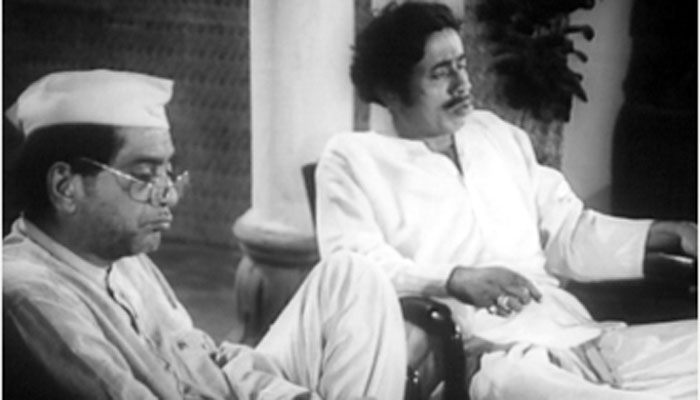

Original name: Samna
English name: Samna
Year: 1975
Run time: 151’
Language: Hindi
Type (Colour/ Black & white): Black & White
Country: India
Director: Jabbar Patel
Producer: Ramdas Phutane, Madhav Shinde
Cast: Mohan Agashe, Shreeram Lagoo, Usha Naik, Vilas Rakte, Smita Patil, Nilu Phule
Screenplay: Vijay Tendulkar
Cinematographer: Suryakant Lavande
Editor: N.S. Ved
Sound Designer: Mangesh Desai
Music Composer: Bhaskar Chandavarkar
Costume Designer: Khatavkar
Production Designer: Dinanath Chavan
Production Company: Amol Chitre Prakashan, Giriraj Pictures
Dr. Jabbar Patel (born 23 June 1942, Pandharpur) is a Marathi-language theatre and film director of India. His production of the play Vijay Tendulkar's play Ghashiram Kotwal, in 1973 is considered a classic in Modern Indian Theatre.
He is the maker of classics films in Marathi cinema, like, Samna Jait Re Jait (Mohan Agashe, Smita Patil), Umbartha (Smita Patil, Girish Karnad), Simhasan (Nana Patekar, Shreeram Lagoo, Reema Lagoo) Some of his other films are, Mukta, Ek Hota Vidushak, and Musafir(Hindi). His most acclaimed film is Dr. Babasaheb Ambedkar released in 1999.[2] He won the 1995 Nargis Dutt Award for Best Feature Film on National Integration for his Marathi film, Mukta.
Born in 1942 in Pandharpur in Maharashtra, having taken primary and secondary education in Haribhai Deokaran Highschool Solapur, he was at first a paediatrician. He founded the Marathi experimental theatre group, 'Theatre Academy', which staged Vijay Tendulkar's Ghashiram Kotwal in 1973, followed by, 'Teen Paishacha Tamasha', an adaptation of Brecht's Threepenny Opera in 1974.[3] He wrote the lyrics of the song 'Raya asa dhondu naka angala' from the film 'Samna'. He has worked on the film based on the life and work of Santoor maestro Pandit Shivkumar Sharma.
For Jabbar Patel, tackling a political subject is not something new. Whether it was Umbartha, Jait Re Jait, or Simhasan for the silver screen, or Ghasiram Kotwal for the stage, he has handled political subjects. His recent film is also political based "Yashwantrao Chavan".
Jait Re Jait (1977) is a musical milestone in the history of Indian cinema, and expresses the stories of a forgotten tribe through dance and a total of 19 songs. Next came Simhasan (1981) made in a montage style with 35 characters.Both won National Awards. One of Patel’s most acclaimed works is Umbartha (1981), a film about domestic violence, featuring Smita Patil as the Superintendent of a woman’s reform home who is abused by her husband.
1. Wealthy and influential Hindurao Dhonde Patil finds a homeless drunk, brings him home, looks after him, feeds him, finds a room for him, gets him employed, calls him Master, and even finds a woman to look after him. In return, this male steals from Hindurao, is apprehended by the local police, but Hindurao pays for his bail. Hindurao is forced to make a final decision about him after he finds out that Master has been inquiring about a missing army officer named Maruti Kamble.
2. A middle aged drunkard arrives in a village in a bus at the bus stand people are talking about someone called Maruti Kamble.The news reaches sugar baron Hindurao - Dhonde Patil who believes that the drunkard must be a government official come to stop his wrong doings.He sends his henchmen and invites the drunkard to his mansion. As the drunkard doesn't disclose his name he calls him Master.Hindurao tells Master that he is the man behind the progress of his village who has put sugar factory,poultry and schools for village.But Master sees the progress is only of Hindurao and not his village.Master again here's some conversations about Maruti Kamble when Hindurao comes to know that master is inquiring about Maruti Kamble he gets worried decides to tell him everything.But Hindurao tells Master that after telling him the whole tale he should stop his inquiry here and leave the village.